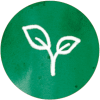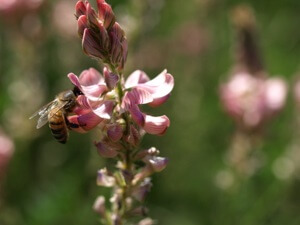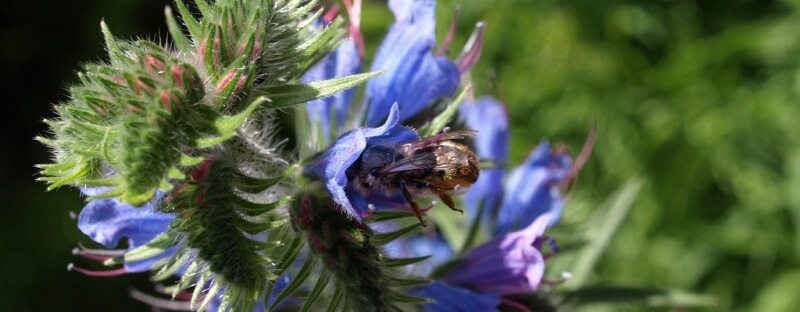 Blooming landscapes
Blooming landscapes
Protection of the biodiversity in the South of Germany
The bee mortality is rising worldwide. Especially in the South of Germany, bees and other insects are affected by changes in the ecosystem: varroa destructors, poisonous chemicals, and the decline of blooming flowers are main threads to the survival of bees. From July on, many insects are already facing food shortages. With diverse flower meadows, bees and other insects are provided with a rich offer of nutritious food again. Also wild animals benefit from the intensification of agricultural fields. Furthermore, the richly colored areas enrich the scenery.
Necessity
Bio diverse flower fields as a habitat and source of nutrition
Activity
Motivate field owners to plant perennial flower crops mixes and support them in the implementation
Countable effort
Surface (in square meters) of flower fields that could be planted and cultivated through the donation
Result
Measurable increase of the biodiversity through the project
Systemic effect
Stabilization of the number of bee colonies in the South of Germany
Background
Previously extensively used surfaces are today intensively cultivated. Traditional crop rotations were replaced by monocultures. The traditional orchards and hedges had structured the landscape and offered sufficient nutrition to bees and other insects. Since these structures become rarer, the basis for food for bees and insects disappears. Therefore, the Bodensee-Stiftung promotes bio diverse and blooming landscapes since many years. The network ‘Blühender Bodensee’ (Blooming Bodensee Lake) brings together farmers, municipalities, and environment protection agencies. The sowing of indigenous flower mixes is one major task of the network. Furthermore, the cooperation with biogas-farmers can have important impacts. For instance, special perennial flower mixes can be cultivated as an alternative to corn. This way, everywhere in the region, blooming little islands offer the insects sufficient nutrition.
The good deed
The planting of blooming areas is carried out in strong cooperation with regional players. The choice of the location, the size of the area, and the fitting flower mix is taken together with the project's partners. The flowers stand for several years, thus, guaranteeing the insects a long-term habitat and embedding the flower islands in the landscape.
Challenge
The acquisition of surfaces represents a challenge. The land owners have to be sensitized for the issue, so that they can recognize their personal benefit of the flower fields. Before the planting of a perennial flower field, not only the ecological but also the social and economic aspects have to be analyzed in detail. The Bodensee Stiftung can draw on numerous years of experience in this process.

AboutDeutschland
Berlin
Capital
80.781.000
Number of inhabitants
44,999 USD
Gross domestic product per capita per year
5
Human Development Index
The South of Germany is particularly hit by bee mortality.
About the organization and further information
Association
Bodensee-Stiftung e.V.
PHINEO
Further information and source
- http://www.bodensee-stiftung.org/
- http://www.efsa.europa.eu/en/topics/topic/beehealth.htm?wtrl=01
- http://www.bluehenderbodensee.net/documents/NetzwerkBluehenderBodensee_Broschuere_2010.pdf
- http://www.bluehende-landschaft.de/fix/doc/Eckpunktpapier-Bluehstreifen-final.pdf
- http://lebensraum-brache.de/wp-content/uploads/2014/02/NLF_Praxisratgeber_April14.pdf




